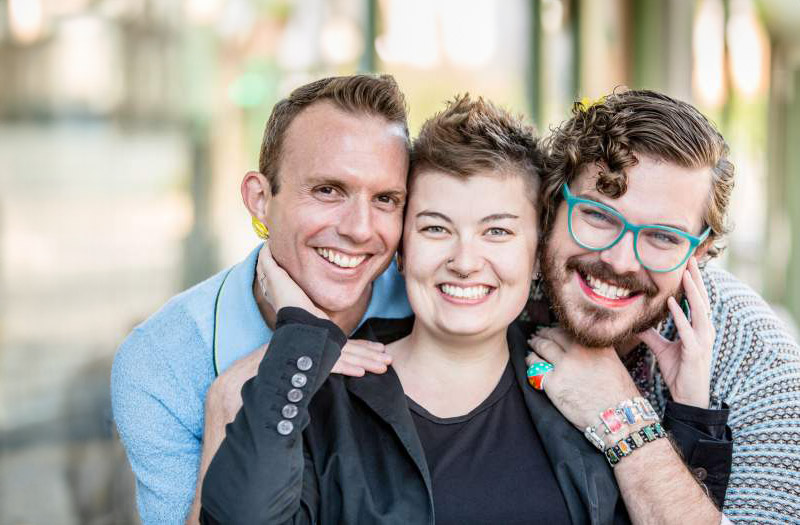Opportunities and challenges for non-monogamous relationships

Polyamorous and non-monogamous relationships offer a variety of opportunities to live a fulfilling relationship and sexuality. However, you have to be prepared to leave old thought patterns behind and consciously and honestly face the challenges that this (new) type of relationship demands. What opportunities and challenges do we see?
Taking responsibility for yourself
In a polyamorous relationship, it is essential to know yourself very well. So consciously deal with your feelings, your familiar relationship patterns, your body and your lust and take responsibility for them. Actively seek to come to terms with yourself. Attend seminars, annual groups and retreats. Perhaps therapy or counseling is the right thing for you. See self-awareness as the key to your personal growth.
Learn to talk about yourself and your sexuality
In polyamorous relationships, people need to talk about their sexuality. And not just at the beginning of the relationship or in crises. Establish a culture of conversation and feedback in which you talk openly about sexual desires, needs,
fantasies, changes and plans, fantasies, changes and plans of everyone. Discussing this is the basis for a functioning polyamorous network.
Practice finding consensus
Polyamorous people deal with negotiating consensus. Don't assume that they all know each other inside out. Always ask about current wishes and needs and talk about what everyone feels like everyone wants at the moment. In this way, together you can create a relationship that suits everyone.
Share connection and presence with everyone
Make room for eroticism, sensuality, attention and sexuality for everyone in your relationship. Try to be present and give the feeling of seeing the other person. Establish rituals instead of routines. Rituals create special moments of intimacy and uniqueness.
Give the difference a space
Polyamorous people not only look for similarities, but also for differences. They have respect for individual wishes, characteristics and needs. Difference is seen as a resource and an opportunity, not anobstacle. Give each other space so that everyone can cultivate and expand their own areas of experience. What this freedom looks like is negotiated individually by everyone involved.
Make agreements based on trust and closeness
Agreements between polyamorous couples are based on closeness and trust. They know that they are the ones who create something special and exclusive together. They know that their relationship is not interchangeable, replaceable and therefore arbitrary.
Encourage curiosity and a willingness to experiment
Don't stop where things are already working well already works well, but keep trying out new variations. Be playful, curious and keen to experiment and be brave enough to expand your comfort zones.
Have the courage to fail
Don't be disappointed if things go differently than expected. Take failure as an opportunity to grow.
Humor, lightness, honest communication and a constructive attitude are elements in overcoming negative experiences.
Support each other in emotional crises
Support your partners in emotional crises such as jealousy, shame and other difficult situations. Especially if one of you is not feeling well, has had a bad experience or traumas from the past "trigger" a situation (trigger strong emotions), be particularly attentive and actively offer support. (trigger strong emotions), be particularly attentive and actively offer offer conversation, reflection or physical closeness.
Invest more in solutions than in arguments
Spend time, energy and creativity on finding solutions to incompatible wishes, desires and desires. Couples who value their relationship and sexuality understand when the other person says no. A no "not that" or "not now" is valid for the moment and does not have to mean a fundamental rejection.
Practice generosity
Polyamorous relationships are based on generosity. Not only materially, but above all ideally. Be helpful, patient, empathetic, interested and treat each other with an open heart.
Compliment each other and express your affection verbally in everyday life.
Not all points are always equally important for everyone, because life and priorities differ. However, we want to encourage and inspire you to look at all the criteria - alone or together with your partner. You may be surprised what processes are triggered as a result.
- Which of these points are alive in your relationship?
- What is unfamiliar to you?
- What would you be curious about?
- Which of these things have you lived in the past and what has lost over time?
- What do you miss the most?
- Which area would you like to (re)revive (re)revitalize?
We look forward to accompanying you in this process. Give us a call or write to us. Give us a call or write to us.
Blog articles and News
We write blog articles on selected topics. Sometimes we invite guest authors. In this case, we will write the author's name under the article.
Here you will also find current information, such as announcements and reviews of our lectures and workshops. We also post press articles in which we appear and other internal News

